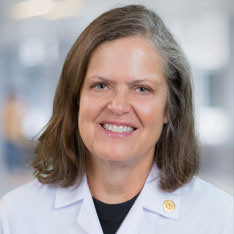Long-time University Health infectious disease specialist, Dr. Jan Patterson, found herself at a painful crossroads in 2012. Her 18-year-old son had died from suicide, and she was undergoing treatment for cancer. Suddenly, all of her conventional medical training and experience was not enough to address the pain, grief and stress exhausting her health and spirit.
These personal challenges led Dr. Patterson, who is also a professor of Internal Medicine and Infectious Diseases at UT Health San Antonio, on a journey to explore treatments that incorporate less conventional therapies. These types of treatments are referred to as integrative medicine.
“I believe in traditional medicine; I'm a cancer survivor. I believe in the surgery and the medication. The pharmaceuticals and procedures we have these days are amazing,” she explains.
But she saw the impact of these therapies on herself and felt drawn to learn more. She ultimately completed a fellowship at the Andrew Weil Center for Integrative Medicine and co-authored a book titled Breath for the Soul: Self-Care Steps to Wellness. “Integrative medicine includes other tools that you can use yourself. You're empowered to do these things for self-care,” Dr. Patterson said.
What Is Integrative Medicine? 
Integrative medicine combines traditional treatments like medication and surgery with more holistic therapies not often taught in medical school. They include:
- Breathing exercises and meditation to help reduce chronic pain and stress
- Herbs & supplements to soothe the nervous system
- Healthy nutrition for reducing anxiety, depression and disease
- Acupuncture to relieve pain and anxiety
- Aromatherapy for many benefits including pain reduction, reduced anxiety, boosting mood and combating the side effects of chemotherapy
Benefits of Integrative Medicine
Integrative medicine techniques are often simple yet effective practices patients can use on their own. Among the other benefits:
- They are non-pharmacological, so you won’t have to add more medications to your routine
- They help manage chronic pain without opioids, a condition for the accreditation of health care organizations by The Joint Commission. Health providers must include treatments for pain that are not based on medication.
- Therapies support overall wellness by addressing mental and physical health
- They improve the effectiveness of other medical treatments and therapies, working in tandem with your existing care plan
Integrative Medicine Is Based on Medical Evidence
Dr. Patterson, board certified and medical director of Integrative Medicine at University Health, is quick to point out the less conventional therapies are not just feel-good practices. They are based on evidence collected through research and observation. She herself contributed to the research during the COVID-19 pandemic when hospital staff had problems wearing face masks all of the time. Some developed rashes and struggled with headaches, anxiety or discomfort.
Dr. Patterson and a team member, seen in this video, placed drops of various essential oils with unique qualities on employee masks:
- Orange to boost mood
- Lavender to soothe and reduce stress
- Peppermint for promoting mental focus and to combat nausea and headache
- Eucalyptus to support the respiratory system and mind
“When we inhale through our nose, the aromas go up our smell nerve – the olfactory nerve – right to the primitive part of our brain,” said Dr. Patterson. “That’s the part of our brain that controls emotions and motivations, so the sense of smell is really very powerful in terms of influencing how we feel.”
Dr. Patterson’s research found that staff who participated reported the number of their mask-related symptoms declined by almost half, with anxiety, pain and fatigue decreasing the most.
Are Integrative Treatments Recommended for Children?
The National Institutes of Health has found that some of these less traditional therapies can be effective and safe for children, but parents should be cautious.
Dr. Patterson says essential oils and aromatherapy can help children overcome pain or anxiety, though stronger smelling oils may need to be diluted because they can be irritating to kids.
Parents should be cautious with dietary supplements because they may contain materials that will prompt allergic reactions. Be aware that over-the-counter asthma products may not have been evaluated by the U.S. Food and Drug Administration for safety.
The NIH says mindfulness, yoga, biofeedback and guided imagery are low-risk and have been shown to reduce anxiety and stress in children. Parents, however, should consult with the child’s health care provider first.
How Do I Access Integrative Medicine?
Dr. Patterson, whose book was published in 2022, says there is a lot of good, accurate information online about integrative medicine practices. She recommends checking out the Health Hub at the Andrew Weil Center for Integrative Medicine where she studied.
Patients admitted to University Hospital have access to a number of integrative medicine therapies. Ask your doctors or nurses to connect you with the Integrative Medicine team.




